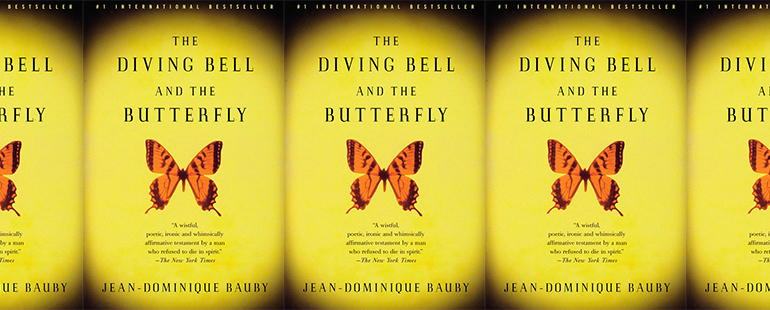The Creation of The Diving Bell and the Butterfly

The story is by now famous: in 1995, ELLE editor-in-chief Jean-Dominique Bauby had a stroke that left him experiencing “locked-in syndrome,” in which all voluntary muscles were completely paralyzed except for the ones that controlled the movements of his left eye. Bauby’s mind was lucid, his thoughts were coherent, and—not being able to move or speak to express himself—his imagination was working overtime. In his memoir, The Diving Bell and the Butterfly: A Memoir of Life in Death, written during his long hospitalization and published two days before his death in 1997, he portrayed both the excruciating minutiae of his life in the hospital, away from both his Paris home and any previously familiar means of motion, speech, or independence, as well as the ways in which he allowed his mind to take him far away from the suffering of his body, transporting him to places real and imagined, visited or only read-about, that he explored silently, letting his mind wander and venture off as he waited for the minutes of each day to tick by.
Is it any wonder that Bauby chose to escape into his own mind? His daily routine was a repetitive, harrowing process of being bathed and dressed with varying degrees of discomfort, dragged from bed to a wheelchair, and pushed around the hospital grounds. Some of the nurses were tender while others gruff. Some were more attentive to his eye signals—the sole means at his disposal for conveying even his simplest wishes, such as wanting the door closed or the television turned off—than others.
Blinking is also the only way he could write the book. Bauby’s speech therapist taught him a method of blinking in response to the reading aloud of an alphabet rearranged by frequency of use; a ghostwriter, Claude Mendibil, sat by his side for hours each day as he communicated every letter, every word, and every sentence to her with excruciating slowness. Often, he composed entire chapters in his mind ahead of time, so that when the time came to dictate them, they were already fully formed and ready to be delivered.
I compare this to my own writing process, how fidgety and uncomfortable and sometimes downright whiny I get about sitting leisurely at my laptop and typing words into an empty page. I force myself into the act by reminding myself that it’ll make me feel more like myself in the long run, but moment by moment I mostly feel insecurity, self-judgment, nausea. I don’t pause to appreciate the ease with which my fingers glide over the keyboard, or the fact that I can take a break to stretch or eat solids whenever I need to. I complain about the solitary nature of the work rather than celebrate the fact that I can perform these actions independently, and that I can quickly type out whatever I have to say.
The thing I worry about the most as I write and workshop my writing is the notion of being misunderstood. That my intentions aren’t clear, that I might inadvertently say something inappropriate, that what I think I’m saying won’t be what people end up reading. I get stomachaches just thinking about it. Compare this to Bauby’s predicament—he had to take the time to clarify and revise the ideas that came to his mind as he sat alone before his writing sessions, moving through not only a first draft but likely several revisions in his head before his ghostwriter even arrived so that he could offer her a clean final draft. An off blink would be enough to change the meaning of a sentence, the punchline of a joke, or the point of his message. Revising would take hours.
I try to envision what it must be like to compose pages in one’s mind before communicating them to a ghostwriter. So much of what I write only comes to me as my hand is moving across the keyboard or notebook. I often don’t know what I’m going to say until I say it, and if I was able to figure it out beforehand, I’m quite certain I’d forget every bit of eloquent phrasing I’d crafted by the time I had to convey it to another person. It probably would not come out nearly as smoothly as it had been put together in my mind, especially when taking into account the pace with which every word would have to be communicated between author and transcriber.
But compose this way Bauby did, and to great effect. Despite the rigorous production method, Bauby’s mind wanders throughout the book, resulting in the vivid connection between his present and his past. Taken at face value, the short chapters of his memoir appear to be merely vignettes, skipping seemingly without rhyme or reason between depictions of day-to-day life at the hospital and memories of a lost past in Paris. But tracing the trajectories Bauby moves through gives the impression of a search for some sort of connective plotline or driving rationale across the events of his own life. Thus, he moves between a description of the long and painful process of attempting to ingest fluids again to the dissolution of a committed relationship, rendered against the backdrop of his lack of religious faith. He describes his many visits to a small gallery at the hospital, where he sees a depiction of a visit from Empress Eugénie de Montijo; during one trip, he fantasizes about being coddled and comforted by her, only to have his daydream interrupted by his own reflection staring back at him from the glass protecting the image. He juxtaposes the cold and aloof attitude of some of his friends, who have grown distant and impatient with him since his hospitalization, against his own overly-judgmental thoughts about some of his medical caretakers. And toward the end of the book, Bauby recounts the events of the day of his stroke, making sure to linger on the ending of his marriage and lessened connection with his children that preceded it.
By setting these events from before and after his life transformed side by side, Bauby creates a holistic and rich record of his personality and private history. With this construction, he also shares his search for a plot, for a theme by which to define his life—two typically critical elements for the creation of life conveyed in book form. While it may seem like he is committing to an impossibly difficult task by composing his memoir in his own mind before dictating it slowly, one blink at a time, his central means of storytelling is, in fact, a way to seek reason and logic within his own story; the act, the form, and the narrative mirror one another. It is not only the act of writing that is essential for maintaining a connection with the outside world, but also the empathy at the heart of Bauby’s search for meaning in his own unique predicament.


